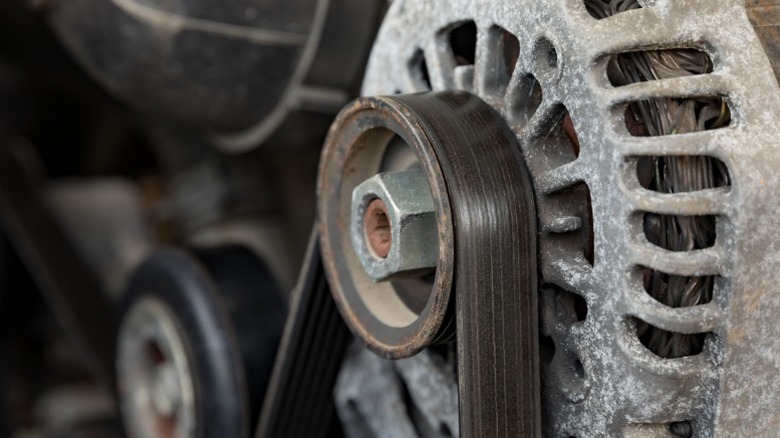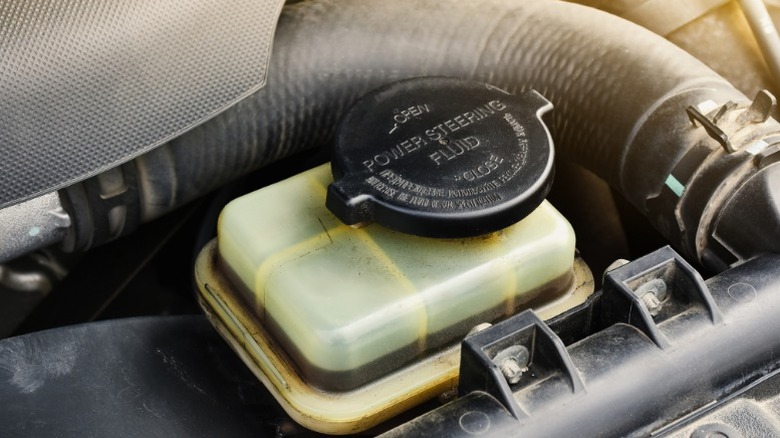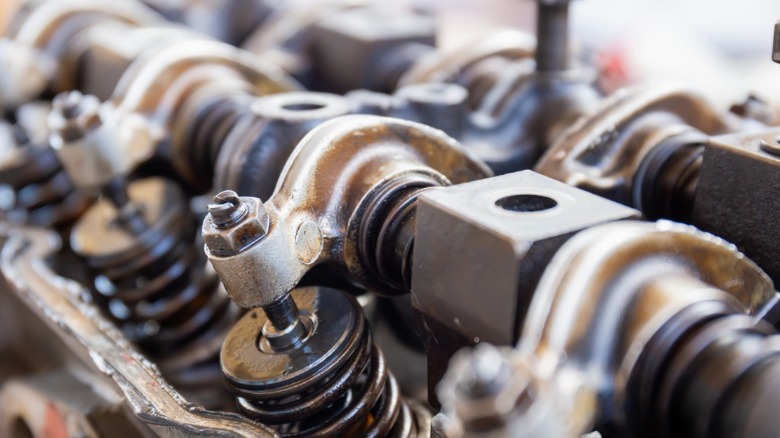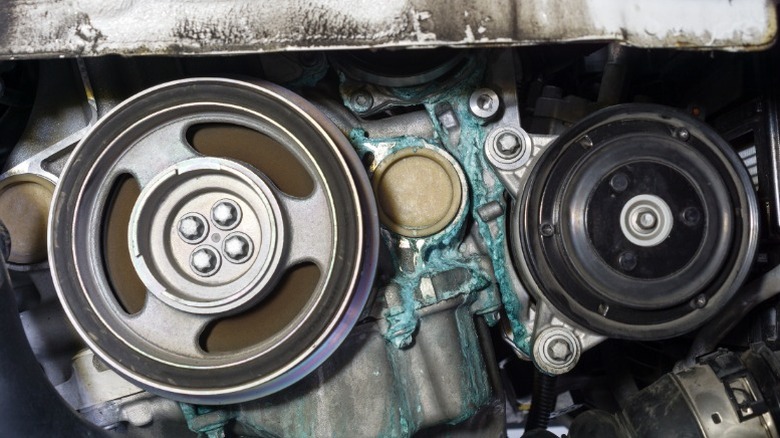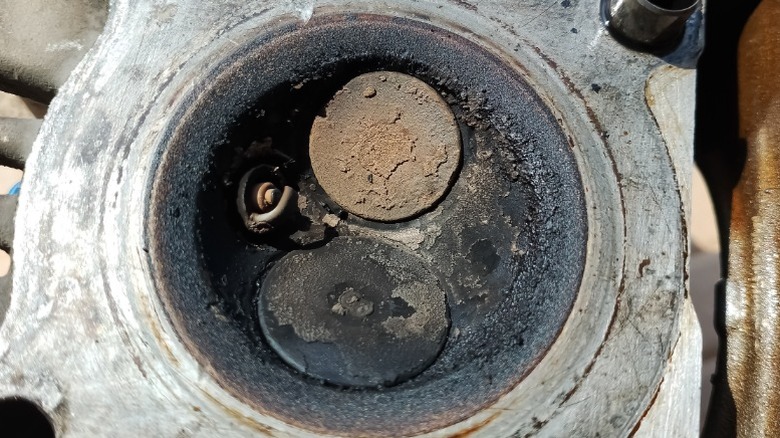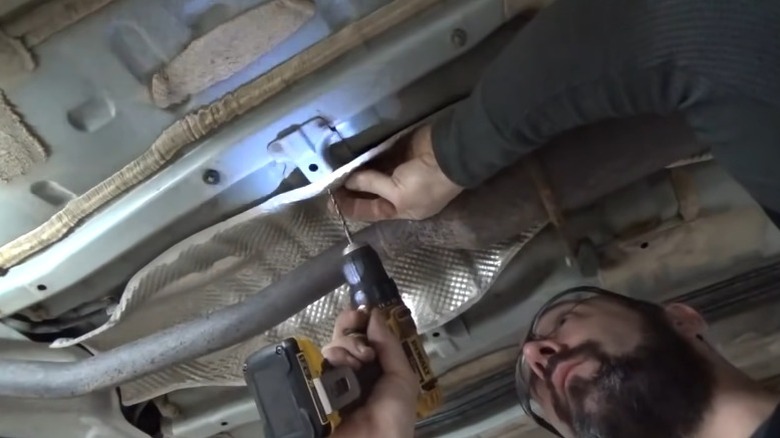6 Worrisome Engine Noises And What They Each Likely Mean
Our cars can make some pretty strange sounds. If you drive them for long enough, you'll most likely experience some fairly unsettling noises at some point or another. While any unusual sound coming from your vehicle can be worrisome, those that emanate from your engine bay are often some of the scariest. That's because the internal combustion engine is the heart of most contemporary cars — if it fails or begins to act up, it could cause your entire vehicle to shut down.
While taking adequate steps to protect your car — like keeping up with routine maintenance — can help you avoid some of the most serious problems and malfunctions, nothing in life is guaranteed. Even if you take the absolute best care of your vehicle, it may still develop issues from wear and tear over time. Fortunately, educating yourself and learning about some of the most common signs of mechanical failure and malfunctions can help you avoid more serious issues. Engine noises, in particular, are something to which you should pay special attention, as catching them early can help prevent the development of more extreme — and more financially devastating — problems.
Luckily, we here at SlashGear can help with that. As a former professional mechanic and a lifelong gearhead, I'll explain some of the most worrisome engine noises your vehicle can make and the most likely reasons why they appear. We'll cover the issues that lead to these sounds, as well as some of the potential fixes.
Squealing or chirping sounds can indicate drive belt problems
If you drive a car with a fossil fuel-powered engine, it most likely uses either one or two drive belts or a serpentine belt. These belts are designed to transfer energy from the crankshaft to the camshaft(s) and various other engine accessories, like the air conditioning compressor, alternator, power steering pump, and more. These belts are made from extremely durable components and generally last for many thousands of miles. However, they're not indestructible. These belts are subject to wear and tear over time, and most automakers typically recommend that drivers replace their drive/serpentine belts every 60,000 to 100,000 miles.
That said, even if you're not close to that mileage threshold, your serpentine belt may still fail or develop issues. Fortunately, serpentine belts usually display a few common signs when failing, including some pretty unpleasant noises. One of the most frequent signs of serpentine or drive belt failure is a loud chirping or squealing noise, especially when you first start the engine. There are other issues that can cause similar sounds. However, belt noises are relatively easy to identify by popping the hood and listening for the source of the sound. Furthermore, if your belt is squeaking, it may also have physical damage, like cracks and frays.
If you notice issues like this, don't worry too much. Serpentine and drive belt replacements are pretty cheap and usually cost between $75 and $150 if you pay a mechanic to perform the service for you. If you choose to perform the replacement yourself, you'll only have to pay for the new belt, and it's worth exploring, as serpentine belt replacements can be one of the easiest and best DIY auto jobs for beginners, depending on your car.
Groaning sounds could be a sign of power steering issues
Power steering systems are responsible for making it so easy to turn the wheels in modern cars. If you've driven antique cars without these systems or a contemporary vehicle with a power steering malfunction, you probably understand how vital these components are. Today, many vehicles are built with electric power steering systems. However, hydraulic power steering systems are still extremely prevalent and can cause some eerie — and worrisome — noises when they fail. They work using a belt-driven pump, a series of hoses, hydraulic fluid, and a steering gear. The power steering system can display various symptoms when it malfunctions or requires service, including loud groaning or screeching noises when you turn the wheel.
Usually, the issue is due to low hydraulic fluid or a failing pump. If you hear loud whining sounds while turning your steering wheel, the first thing you should do is pop the hood and check your power steering fluid. If the reservoir is full and the fluid is in good condition, there may be an issue with the pump or another part of the system. If the fluid is extremely dirty, a power steering flush may be the solution to your problem. However, if the level is very low, you may have a leak.
When it comes to fixing power steering issues, the difficulty level ranges, depending on the type of malfunction. For example, topping off your power steering fluid is quick and simple, and it may temporarily solve your problem until you can visit a mechanic. Other jobs, like replacing the power steering pump or gear, are much more difficult. If you suspect a power steering problem and aren't an experienced home mechanic, the best and safest option is to visit a pro.
Grinding and clunking noises can indicate mechanical failures
Your car's engine bay is home to a massive amount of parts. Besides the engine itself, which contains many internal components, various belt-driven accessories — like the alternator, AC compressor, and power steering pump — are housed beneath the hood, along with other components like the radiator, air intake system, battery, engine control module (ECM), brake booster, and many more. Each of these parts and systems is vital for your car's performance. However, most of them are also subject to wear and tear over time, and some of them can cause some pretty worrisome noises when they experience mechanical failure.
Some of the most common sounds you're likely to hear if there's a problem with one of the components inside your engine bay include grinding, whirring, chattering, tapping, and clunking noises. These issues can be due to things like damaged drive belt pulleys, loose or broken fan parts, as well as damaged internals like faulty valves, lifters, or bearings. The problem is that diagnosing these noises isn't always easy. Things like damaged pulleys are usually relatively obvious, thanks to visible physical damage or clear erratic movement when the engine is running. However, internal problems require a much deeper inspection. Usually, we try to pinpoint internal sounds by listening to the engine with a mechanic's stethoscope or a long screwdriver. That's only a preliminary step, though, and identifying busted internal components definitively usually requires a professional.
If your engine hisses, it may have a coolant leak
Your car's engine cooling system is one of its most vital components. As the name implies, it helps prevent engine overheating problems, and it works by sending coolant — a mixture of water and antifreeze — through the engine to absorb heat and carry it away from the sensitive internal components. However, because of the cooling system's reliance on liquid coolant, it's vulnerable to leaks, which can lead to various problems, including some nasty noises if the fluid leaks onto your blazing hot engine.
When coolant spills onto an extremely hot engine, it's likely to rapidly begin boiling, resulting in a characteristic hissing sound and, most likely, steam. If you experience this issue, it's probably due to a combination of problems: you have a coolant leak, and your engine is overheating. Those issues frequently go hand-in-hand, as a coolant leak will diminish the system's ability to cool down the engine. However, various issues can cause your engine to overheat, and not all coolant leaks are visible. That means the problem may not always be easy to diagnose. Obvious coolant leaks will usually leave puddles of brightly-colored, sweet-smelling liquid below your car or crusty buildup inside the engine bay. However, if your vehicle has an internal coolant leak, the issue might not be obvious at first.
It's important that you monitor your coolant reservoir regularly to stay ahead of these problems. Cooling system issues don't always require years of automotive experience to repair. For example, replacing a torn coolant hose is relatively simple and could be the solution to a minor leak. In contrast, water pump replacements usually require an expert. Considering the cooling system's importance, you should visit a pro if you experience overheating issues or hissing sounds, especially if you're a car novice.
Knocking or pinging could mean there's an issue with the combustion process
If your car relies on fossil fuels for its power, then you probably already know that the engine depends on a series of small, controlled explosions known as the combustion process. It's the core function of any internal combustion engine, and it relies on the teamwork of a network of internal and external parts. However, as is the case with nearly every automotive component, engines and their internal parts are subject to wear and tear over time, especially if you don't take the proper steps to maintain them. The combustion process, in particular, relies on a series of parts, but when they fail or develop damage, they can lead to some concerning noises.
Engine knocking is often considered to be one of the scariest and most ominous sounds your car can make. It can sound like a metallic pinging noise, and it's usually due to a malfunction with the ignition and combustion process. These sounds can manifest as the result of various problems. However, some of the most common malfunctions and issues that lead to engine knocking and pinging include things like using the wrong fuel, improperly calibrated ignition timing, and carbon buildup. Any time you experience issues like this, you should try to visit a professional mechanic for an inspection, especially if you're a car novice. Engine knocking can lead to several other problems, and many of them come with steep repair costs, so it's best to address these noises as soon as possible to avoid more serious damage.
Sputtering and rattling sounds could signify exhaust problems
Your car's exhaust system is responsible for expelling the byproducts of the combustion process. It works together with the emissions control system to convert toxic waste gases, like nitrogen oxide, carbon monoxide, and nitrogen dioxide, into less harmful substances like carbon dioxide, nitrogen, and water. The exhaust system is one of the largest networks of parts on your car, and it stretches from the exhaust manifold at the engine all the way to the tailpipe. It can cause some pretty alarming noises when it develops damage, including some unsettling sounds from the engine bay.
Those sounds usually take the form of sputtering, chugging, or rattling noises, but you may also notice that your car runs extremely loudly if there's an issue like an exhaust leak. When you hear these noises from your engine bay, the most likely culprits are the exhaust manifold or headers, heat shields, and, depending on your vehicle's make and model, catalytic converters. Sputtering and chugging noises can indicate clogs in the exhaust system and are usually due to things like carbon buildup or debris. Rattling noises, on the other hand, are commonly caused by damaged parts and loose heat shields. Fixing these problems can be simple and inexpensive — like reattaching a loose heat shield — or extremely costly, like if you need a new catalytic converter. Exhaust problems can also cause you to fail an emissions test, which may make your vehicle illegal to drive depending on where you live. As with all of the noises on this list, various other problems can be to blame. So, if you experience exhaust sounds or any other strange engine noises, you should prioritize a visit to your local mechanic as soon as possible.

